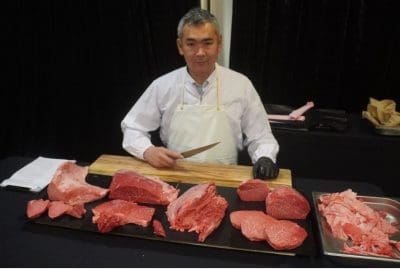JAPAN has voluntarily suspended its exports of Wagyu beef to a range of countries including Australia, following the first detection of Lumpy Skin Disease in a dairy herd in the prefecture of Fukuoka on Wednesday.
Lumpy Skin Disease is sweeping other parts of North Asia, with South Korea reporting more than 150 outbreaks over the past 12 months, but this is the first detection in Japan.
 Japanese authorities have temporarily suspended the issuance of animal quarantine certificates for Japanese beef exported to Australia.
Japanese authorities have temporarily suspended the issuance of animal quarantine certificates for Japanese beef exported to Australia.
Although negotiations are being held to resume exports, there was little hope that trade would be re-opened soon, a trade contact said.
In 2023, the total value of Japanese beef exports worldwide was 57.8 billion yen, or the equivalent of A$566 million. The small volume of exports to Australia last year were worth 700 million yen or A$6.8 million.
Japan regained access to the Australian beef market in 2018, after pressing for a resumption of access for beef exports since 2004.
While only small in volume, the trade in high-value Japanese Wagyu beef to Australia has symbolic significance, marking the end of a 17-year ban on beef imports from Japan to Australia following the country’s detection of BSE in 2001.
Click here to view this earlier report.
Japan’s Ministry of Agriculture, Forestry and Fisheries has imposed thorough quarantine measures following Wednesday’s Fukuoka outbreak. A notice was issued to exporters and local governments informing them of the need to thoroughly implement quarantine measures and temporarily suspend export procedures.
An advice issued to prefectural animal health authorities, cattle owners and veterinarians said it was necessary to efficiently and effectively prevent the outbreak and spread of this disease through comprehensive quarantine measures such as early detection of infected cattle, isolation, self-restraint on movement, and vaccination.
MAFF asked for any cases of suspected outbreak of the disease in cattle in other areas, to be notified immediately.
The ministry advised to be on the lookout for any symptoms that may be due to the disease, such as skin nodules or edema over the body, fever, or reduced milk production. If observed, it advised to immediately isolate the cattle from the herd and keep them under control, and contact a veterinarian or a livestock hygiene centre.
“As there is a risk of the disease spreading through the movement of infected cattle, the health status of cattle must be checked before they are moved outside the farm for shipment or other reasons,” MAFF said.
“Since this disease is believed to be transmitted mechanically by blood-sucking insects (vectors) such as mosquitoes, stable flies and midges, necessary measures should be taken in peacetime to control pests, including spraying insecticides,” it said.
MAFF also recommended caution around shifting feeding equipment from one livestock facility to another. “If it is unavoidable to bring such equipment into the farm, it should be washed, disinfected, and any other necessary measures taken,” it said.
Since there had been reports of LSD infection through blood, practitioners using injection needles, artificial insemination equipment or other items that may come into contact with bodily fluids (excluding raw milk), should change or disinfect them after each animal, MAFF advised.
Rapid spread across Asia
Before 2012, the distribution of LSD had been limited to Africa and Israel. Since then, LSD has spread to many parts of the Middle East, southeast Europe, the Balkans, the Caucuses, the Russian Federation and Kazakhstan. Since 2019, LSD has spread throughout Asia, detected in Australia’s near-neighbour Indonesia for the first time in March 2022. LSD has since been detected in a number of Indonesia’s provinces.
South Korea reported its first infection in September 2023, with more than 150 cases since then.
Last November South Korea’s agriculture ministry said it had completed a nationwide campaign to vaccinate the national herd of some 4.05 million cattle, just two months after the country reported its first infection. However reports continue of new infections this year.
Click here to see an earlier review of Japanese high quality Wagyu beef exports to Australia
